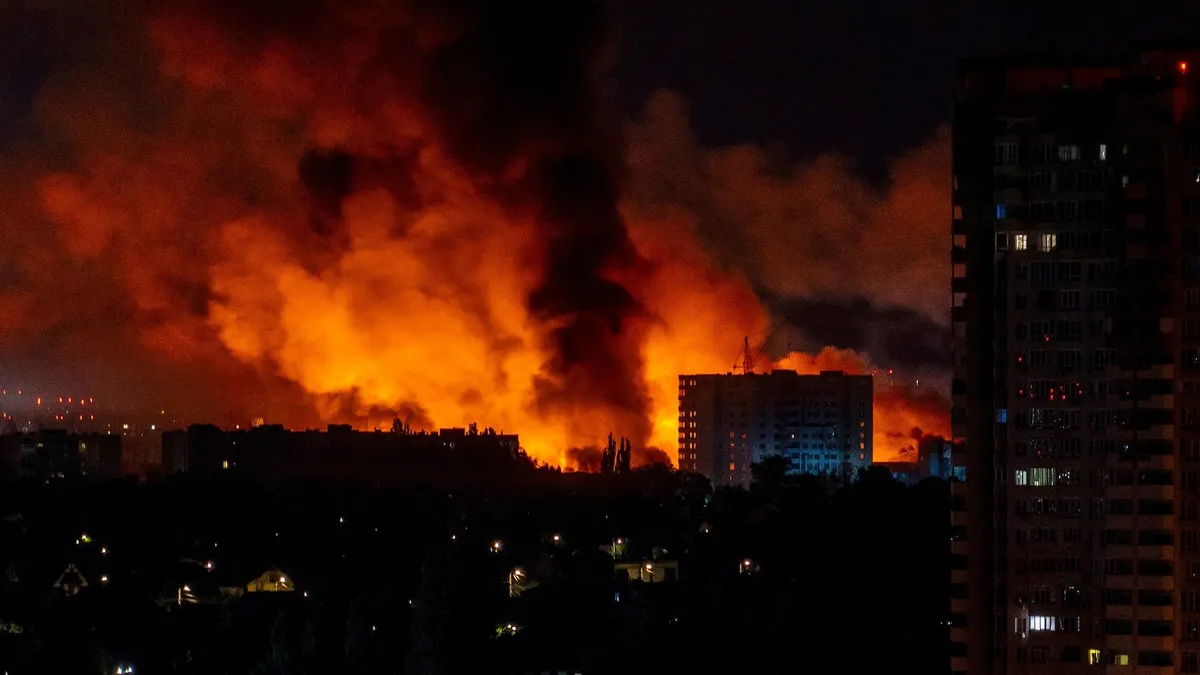
In a shocking escalation of hostilities, Russia launched its largest missile and drone attack on Ukraine to date, targeting the capital city of Kyiv with a staggering number of drones. This unprecedented assault occurred shortly after a conversation between U.S. President Donald Trump and Russian President Vladimir Putin, where Trump urged Putin to consider ending the ongoing conflict.
Throughout the night, hundreds of Russian drones descended upon Kyiv, creating chaos and destruction. Eyewitness footage revealed enormous fires and thick plumes of smoke engulfing the skyline. Many residents described the night as one of the most intense since the onset of the full-scale invasion, waking up to a city shrouded in smoke from the lingering fires. Tragically, at least one individual lost their life, with 23 others reported injured, according to the mayor of Kyiv. During the assault, numerous residents sought refuge in the city's metro system, using it as a shelter from the relentless attacks.
Following the missile and drone barrage, President Trump also reached out to Ukrainian President Volodymyr Zelenskyy. During their discussion, Zelenskyy noted that Trump had committed to collaborate in enhancing Ukraine's air defenses. The Ukrainian military reported that Russia had unleashed a staggering total of 539 drones alongside nearly a dozen missiles. This latest attack follows another record strike from less than a week prior, indicating a concerning surge in Russia's production of the kamikaze drones utilized in these assaults.
The timing of the aerial offensive raised alarms, as it began almost immediately after Trump and Putin's phone call. Putin reiterated his refusal to agree to a ceasefire, signaling that the conflict would persist. Zelenskyy characterized the attacks as a cynical move, suggesting they were an overt message from the Kremlin coinciding with the diplomatic discussions. In a statement released on Friday morning, Zelenskyy remarked, "The first air raid alerts in our cities and regions began to blare almost simultaneously with media reports discussing the call between President Trump and Putin." This indicates a deliberate escalation by Russia, demonstrating a clear lack of intention to deescalate the ongoing violence.
After the harrowing night of attacks, Zelenskyy expressed that his call with Trump had been both significant and productive. The two leaders agreed to collaborate on strengthening Ukraine's air defenses, and plans were set for a meeting of their respective teams. Zelenskyy emphasized the importance of direct cooperation with the United States concerning defense industry capabilities, especially in the area of drone production.
Compounding the situation, Russia's major air assault coincides with reports that the Trump administration has temporarily halted the delivery of crucial weapons, including air defense missiles intended for Ukraine. The Pentagon confirmed that it paused a shipment of weapons already in Poland, which included Patriot interceptor missiles, to conduct a review of U.S. military stocks. This decision has raised concerns not only in Kyiv but also among European allies, as well as in Washington, where both Democrats and some Republicans fear that Trump may be scaling back U.S. support for Ukraine.
Following his conversation with Putin, Trump expressed disappointment, indicating that he believes the Russian leader is unwilling to bring the war to an end. While Zelenskyy has called for an immediate ceasefire, Putin has categorically rejected this proposition. Trump has also hinted at imposing tougher sanctions on Russia if it continues to stall negotiations, although he has yet to take significant action in this regard.
The recent surge in violence in Ukraine highlights the urgent need for a diplomatic resolution to the conflict. As the situation unfolds, the international community watches closely, hoping for a de-escalation that could pave the way for lasting peace. The cooperation between the U.S. and Ukraine remains crucial in these challenging times, as both nations strive to bolster their defenses against continued aggression from Russia.